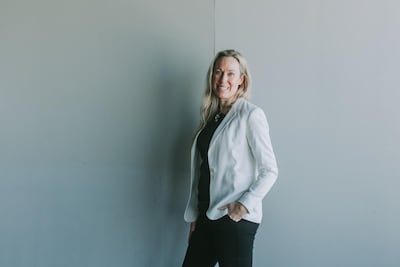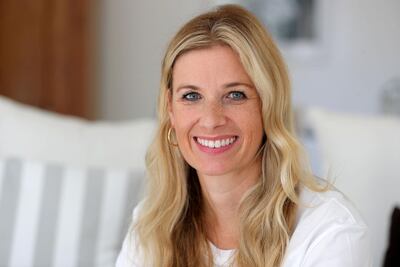When Aggie Nunez embarked on her first solo business venture, surrounding herself with other strong women was key.
Among a growing collective of entrepreneurs who defied the Covid-19 trials of 2020, the Argentinian committed her savings to The Custominded Store while accessing support networks.
“Particularly in e-commerce, it can be a challenge to be taken seriously as it has always been a man-led industry,” says Ms Nunez, who has lived in Dubai since 2011.
“I have been questioned by entities about my professional background, my education or if I am able to handle all the responsibilities … sometimes it can be quite frustrating.”
Ms Nunez acknowledges significant efforts by the UAE to “include women in the business environment”, alongside multiple opportunities giving equal chances to females, be they career women eschewing the corporate rat race or mums realising start-up ambitions for their families.
She sought out like-minded entrepreneurs in groups such as Female Founder Collective, She Leads, a business accelerator by Creative Zone and DWC, and local networks such as Female Fusion.
“It was important to be surrounded by strong, professional women that empowered me, and to remind myself how much I have achieved over the years and how qualified I am to do what I’m doing,” says Ms Nunez.
Formerly a quality manager for coffee brand Lavazza, she left full-time employment after her daughter, Isabella, was born three years ago.
While getting to enjoy “priceless moments”, she gained perspective on how resourceful and creative mothers have to be with both money and time.
And when the pandemic-led lockdown in April had her struggling for unique birthday gifts, she developed a platform matching shoppers seeking customised gifts with make-to-order merchants.
Ms Nunez currently utilises personal funds for expenses. She says being without a salary alongside economic uncertainties could be “really stressful”.
Funding is a familiar topic for Jen Blandos, managing partner of Female Fusion Network, a community for women in business, female business leaders and those looking to set up.
“We frequently hear from members that they struggle to get funding,” she says.
“Whether this is from banks, start-up funds or even access to entrepreneurial programmes – they often tend to favour larger businesses or industries that are more dominated by men.
“Many female-led businesses in the UAE are also micro-businesses – even smaller than typical SMEs … they often get overlooked for funding and support, but so many micro-businesses have huge growth potential.”
Female Fusion’s brief is broader than financial elements and members come seeking information about how to run their business, or to network with and find support from other female entrepreneurs, no matter what stage of the entrepreneurial journey they’re on, says Ms Blandos.
“We have women just starting out all the way up to women who have owned businesses, many well-known brands in the UAE, for decades and employ hundreds of people. Our motto is ‘we’re stronger together’.”

That has been especially true for some during the Covid era when many mum-led start-ups surfaced – and faced added childcare demands.
It’s something Mariya Khilawala empathises with.
The Indian mother-of-two was due to launch e-commerce business flip19.com in early 2020 after two years of working on the initial concept, but the pandemic struck.
Following a career in the distribution industry, Ms Khilawala had taken time out to become a parent before putting together her retail distribution platform, offering rarely seen brands.
“I had travelled the world and attended many trade shows and conferences where I was always excited about the section for small businesses with amazing ideas,” she recalls.

“These businesses didn’t have the production yield and hence were not feasible to bring to our retail partners. I decided to launch flip19.com to give such products a platform in the Middle East.”
Her enterprise is also self-funded, but she has plans to “seek funding once we have a better valuation”.
Ms Khilawala, 35, says she had a lot of support from the female community in the UAE “as they all can relate to the hard work that goes into raising kids along with a business”, although mainly via people she works with, including customers, friends and mentors.
“Many times I have been asked, ‘how do you manage your kids if you run the business?’ My answer is, I started the business so I can manage my kids well in my own flexible way,” she adds.
“Being a working mum is always a challenge, but the pandemic made it more challenging because the kids were at home all the time, so the only time I could work was nights.”
Dubai-based serial entrepreneur Emilia Ohrtmann recognises such challenges.
Last month, Ms Ohrtmann published her book, It's Your Life, revealing what she learned raising four children, while pursuing business aspirations.
The website designer and consultant, who is originally from Germany, also co-hosts the Mums in Biz podcast, designed to empower women to follow their passion and get their company going.
She says so-called “mumpreneurs” wear more hats and face pressure from more sides as they are also responsible for children.
“I feel, since I became a mum, there are specific issues that my male counterparts don’t necessarily have,” she says.
“As soon as you become a mum, the business is regarded as your side hustle or hobby, which is often not the case. So female entrepreneurs often have to work harder to be taken seriously.”

It’s actually up to female entrepreneurs how they feel about themselves and what they subsequently portray to the outside world, says Ms Ohrtmann.
She also highlights an extensive support network, including It’s Her Way, Future Females, UnLimited, Ellevate, Asentiv, BNI and Mums in Biz.
Ms Ohrtmann says more can be done for mum-led SMEs, such as better and affordable childcare solutions to allow them more freedom.
“Not every family has a nanny that can take care of the children, drive them to after-school activities, cook and do homework with them,” she adds, also citing difficulties in opening a business bank account.
“Obtaining a business licence has become much easier and affordable over the years, but other areas need to catch up.”
Ms Nunez concurs that being a woman in the business environment has always been harder.
She previously worked in human resources as a purchase analyst, in public relations and customer service for global brands such as Louis Vuitton and Fortnum & Mason.
“We were always expected to be a wife, a mother, daughter and we are only one generation away from that stereotype,” she says.
“However, nowadays many women are shaking up their segments and building very successful businesses.”
And that is good for the economy, says Ms Blandos, who adds that “gender bias when it comes to handing out the money [funding] … needs to change”.
They provide jobs, in-demand niche products and services, but she says: “In the UAE, these types of businesses in particular find it difficult to get support. They’re just not considered big enough, some struggle to even be able to open a bank account.”
Zbooni, a payment solution based in Jumeirah Lakes Towers, has come to the rescue to an extent.
It enables transactions among smaller and established start-ups, and has reported a dramatic rise in fledgling female-led firms using its service.
“We’ve seen tremendous growth in women starting businesses, particularly in the past few months,” says chief operating officer Ashraf Atia.
“As with all merchants across the region, there remain certain barriers to start-ups such as access to banking, transactional facilities and finance.”
Zbooni's merchant base is about 50 per cent female in the UAE and 70 per cent in Saudi Arabia.
“A lot of female entrepreneurs are looking for convenient ways to take payments and increasingly looking for other business solutions that can help them grow,” Mr Atia adds.
“What’s clear is that women-led businesses across the region are dynamic and essential contributors to the economy.”
Certainly, easier payment acceptance is one less aspect to consider when embarking on a business venture.
“Running a business is hard,” continues Ms Blandos. “It requires resilience … many entrepreneurs for the first time are surprised by just how much work it is.
“Even those who have been in the game a while can find it overwhelming sometimes.”
She says it’s not just about getting a trade licence and selling products and services, entrepreneurs also need to understand finance, procurement, marketing, public relations, technology and IT.
“If you’ve previously only worked in a large company, many women find this first transition overwhelming,” says Ms Blandos, whose organisation runs networking meetings, knowledge-sharing sessions and a membership portal with pre-recorded e-learning in areas such as legal, HR, business set-up, marketing, retail and distribution.
Then there’s the social aspect, especially when someone has swapped a sociable corporate life for solo working.
“Being an entrepreneur can be really lonely,” says Ms Blandos. “Getting to know other women who are in a similar situation can be really comforting and empowering at the same time.”

